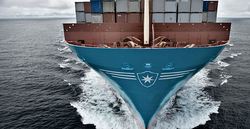Maersk customers absorb IMO 2020 bunker surcharges

Maersk management indicates a ‘high acceptance’ by customers in 80%-90% of its contracts, accounting for around half of the Danish shipping giant’s volumes.
Despite initial resistance from shipper groups, liner customers are coming to accept they will foot the bill for low-sulphur fuel.
MAERSK says it has seen a “high acceptance” by its customers of its bunker surcharge mechanisms in 80%-90% of its contracts, as it prepares shippers for a significant rise in fuel costs due to new global low-sulphur fuel rules that come into force next year.
The company’s senior management team has told analysts that slow steaming was more likely than accelerated scrapping to improve fuel efficiency.
Maersk has previously estimated a $2bn rise in its annual fuel costs due to the International Maritime Organization’s 2020 low-sulphur fuel cap of 0.5% that enters force in January.
At the beginning of 2019, it introduced a new bunker adjustment factor surcharge to help defray the associated costs of meeting the low-sulphur fuel cap, with the total industry-wide bill for preparations put at $15bn.
Maersk’s chief executive and chief financial officer indicated that they are encouraged by recent container market discipline and talk about potential bunker surcharges in the spot market.
Maersk's management “is encouraged by high acceptance of bunker surcharges in contracts and recent market discipline and talk about mitigating higher fuel costs under IMO 2020 in the spot market”, according to David Kerstens, equity analyst at logistics investment consultancy Jefferies.
“Slow steaming is seen as more likely than accelerated scrapping to improve fuel efficiency. Ongoing unit cost reductions of 1%-2% are targeted, while there is limited room for M&A and cash returns for now.”
The company has seen acceptance of its bunker surcharge mechanisms in 80%-90% of its contracts, accounting for around half of the Danish shipping giant’s volumes.
Mr Kerstens said: “We estimated earlier bunker costs could increase by 15%-20% under IMO 2020. However, these prices are set to change, as demand for high-sulphur fuel oil is expected to fall by 65%, while demand for low-sulphur fuel oil could increase fivefold.
“Scrubbers cover around 30% of fuel consumption, while management expressed limited interest in [liquefied natural gas]; instead it would be looking at alternatives to further reduce carbon footprint longer-term.”
The high acceptance level among customers for the adjusted surcharge comes after a rough reception from one customer lobby group when Maersk made the announcement in September last year. The Global Shippers Forum reacted with “suspicion” at the time, arguing that the surcharge “lacks transparency; no data is available to let customers work out how the charge has been calculated”.
Meanwhile, Maersk has invested to reduce the impact of higher fuel bills by signing an agreement to produce IMO 2020-compliant bunker fuel. The venture, between Maersk Oil Trading and Koole Terminals in Rotterdam, will see an annual production expected to cover 5%-10% of Maersk’s annual fuel demand.